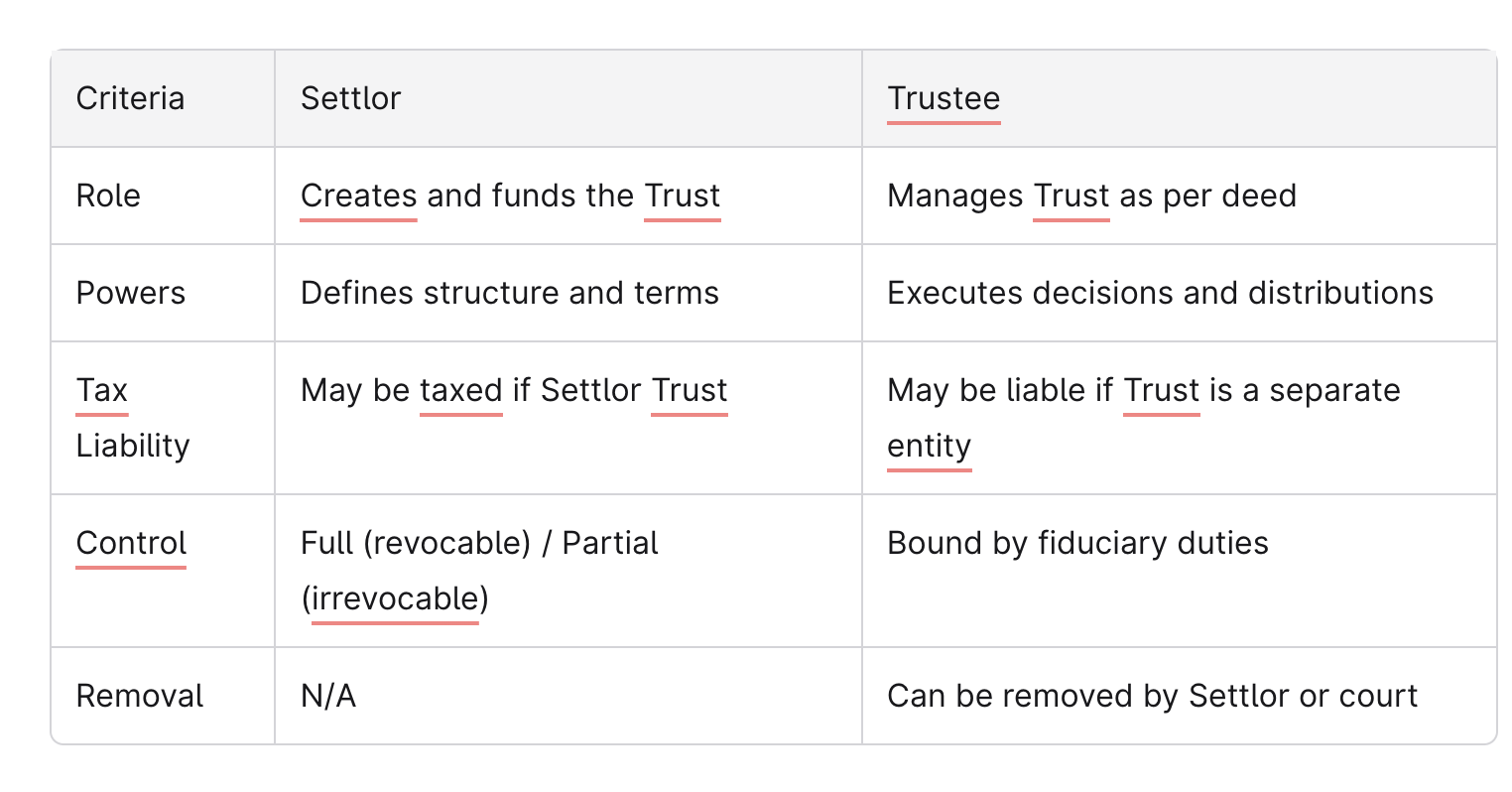In estate planning, a Trust is a legal arrangement where one party (the Settlor, or Grantor) transfers ownership of property or assets to another party (the Trustee) to manage on behalf of one or more Beneficiaries.
The Grantor of a Trust—also known as the settlor, donor, or author of the Trust—plays a foundational role in defining the Trust’s terms, powers, Beneficiaries, and asset allocations.
In this comprehensive guide, we’ll explain who the Settlor is, how a Settlor Trust functions, how it differs from a separate tax entity, and what Indian estate planners need to know about Trust taxation, control, and legal structure.
Who Is The Grantor Of A Trust?

The Settlor of a Trust is the person who creates the Trust by transferring their property or assets into the Trust.
The Settlor decides:
- Who the Beneficiaries are
- What income or benefits they will receive
- Who will serve as the Trustee to manage the Trust
- Whether the Trust is revocable or irrevocable
In India, the Settlor is recognised under the Indian Trusts Act, 1882, which governs the creation, management, and regulation of private Trusts.
Types of Trusts Created By A Settlor
1. Revocable Trust
- The Settlor retains control over the Trust and can change or revoke it at any time.
- Often used for flexible estate or financial planning.
- Not commonly used in India due to tax treatment.
2. Irrevocable Trust
- The Settlor relinquishes control of the assets after creation.
- Offers greater asset protection and tax advantages.
- Most popular structure in India for wealth transfer and succession planning.
3. Inter Vivos Trust (Living Trust)
- Created during the Settlor's lifetime.
- May be revocable or irrevocable.
4. Testamentary Trust
- Takes effect after the death of the Settlor.
- Typically included in a Will.
Settlor Trust vs Separate Tax Entity
Settlor Trust
In a Settlor Trust, the Trust’s income is taxed in the hands of the Settlor.
- The Trust is not treated as a separate tax entity.
- All income, dividends, and capital gains are reported on the individual income tax return of the Settlor.
- Allows greater flexibility in managing investments and distributions.
Separate Tax Entity
- The Trust is treated as an independent entity for tax purposes.
- Must file its own income tax returns.
- Income is taxed either at the Trustee’s level or in the hands of Beneficiaries, depending on the structure.
- Common for irrevocable Trusts in India.
In India, private Trusts can be taxed as either an individual (if determinate) or as an Association of Persons (AOP) depending on the Trust Deed and discretion involved.
Settlor's Role & Responsibilities
1. Creating the Trust Deed
- Clearly defines the rules, provisions, and powers of the Trust.
- Must include:
- Name of the Trust
- Details of the Settlor, Trustee, and Beneficiaries
- Purpose of the Trust
- List of Trust assets
- Duties of the Trustee
2. Funding the Trust
- Transferring property, cash, or securities into the Trust.
- Ensuring compliance with stamp duty and registration laws if the Trust holds immovable property.
3. Choosing the Trustee
- May appoint self, a family member, a professional Trustee, or a corporate Trust company.
- A co-Trustee or successor Trustee can also be named.
4. Determining Beneficiaries and Distributions
- The Settlor defines how the Trust’s income or principal will be distributed.
- May set conditions (eg, age milestones, education expenses, marriage).
Taxation and the Settlor
Indian Perspective
- Irrevocable Trusts are generally taxed as separate entities unless income is specifically receivable by the Beneficiaries.
- If the income is accrued to a single Beneficiary, it may be taxed in their hands.
Gift Tax and Trusts
Under the Income Tax Act, gifts made to the Trust may be taxable if:
- Donor and donee are not close relatives
- Amount exceeds the prescribed limit
- Not created for legitimate purposes like family benefit, education, or maintenance
Benefits Of Being A Settlor
- Control: Decide the structure, assets, and terms.
- Privacy: Unlike Wills, Trusts are private documents.
- Tax Planning: Use of Settlor (Grantor) Trust rules and tax provisions for estate tax and income tax benefits.
- Asset Protection: Shield assets from creditors in some scenarios.
- Succession Planning: Define intergenerational wealth transfer.
Risks and Challenges
- Loss of Control in irrevocable Trusts.
- Tax Complications if not structured correctly.
- Mismanagement by Trustees.
- Legal Disputes if Trust Deed is vague or discriminatory.
Key Differences Between A Grantor & Trustee

Examples Of Settlors In India
- Parent Creating a Trust for Minor Children
- Settlor: Parent
- Beneficiaries: Children
- Trustee: Trusted relative or professional
- Business Owner Setting Up a Trust for Succession
- Settlor: Founder
- Assets: Shares, company property
- Benefit: Tax-efficient transfer and continuity
- HUF Karta Creating a Family Trust
- Settlor: Karta or elder
- Purpose: Managing family wealth and avoiding disputes
The Bottom Line: How Yellow Can Help

The Settlor of a Trust is the foundational figure in any Trust arrangement. In the Indian estate planning context, acting as a Settlor means proactively shaping your family’s financial future through strategic asset transfers, tax planning, and thoughtful succession.
Whether setting up a Settlor Trust for minor children, creating an inter vivos Trust for a business, or planning philanthropic ventures, understanding your rights and responsibilities as a Settlor ensures that your legacy is protected and preserved.
Always consult with a legal and financial advisor to ensure your Trust is structured properly, taxed efficiently, and aligned with your broader estate goals. A well-planned Trust, backed by a clear deed and compliant with Indian laws, is one of the most powerful tools in any estate plan.
At Yellow, we can help you with all aspects of estate planning, including Wills, Trusts, Powers of Attorney, Gift Deeds, Legal Heir and Succession Certificates, and Living Wills. We also offer post-demise and asset transfer services. Our team of legal experts has more than 50 years of combined experience.




